Related Research Articles
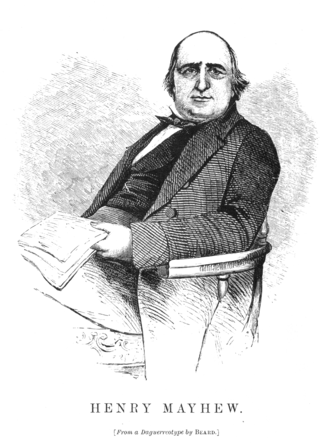
Henry Mayhew was an English journalist, playwright, and advocate of reform. He was one of the co-founders of the satirical magazine Punch in 1841, and was the magazine's joint editor, with Mark Lemon, in its early days. He is also known for his work as a social researcher, publishing an extensive series of newspaper articles in the Morning Chronicle that was later compiled into the three-volume book London Labour and the London Poor (1851), a groundbreaking and influential survey of the city's poor.

Sir Terence David John Pratchett was an English author, humorist, and satirist, best known for the Discworld series of 41 comic fantasy novels published between 1983 and 2015, and for the apocalyptic comedy novel Good Omens (1990), which he co-wrote with Neil Gaiman.

Good Omens: The Nice and Accurate Prophecies of Agnes Nutter, Witch is a 1990 novel written as a collaboration between the English authors Terry Pratchett and Neil Gaiman.

Jack Dawkins, better known as the Artful Dodger, is a character in Charles Dickens's 1838 novel Oliver Twist. The Dodger is a pickpocket and his nickname refers to his skill and cunning in that occupation. In the novel, he is the leader of the gang of child criminals on the streets of London trained and overseen by the elderly Fagin. The term has become an idiom describing a person who engages in skillful deception.

A mudlark is someone who scavenges the banks and shores of rivers for items of value, a term used especially to describe those who scavenged this way in London during the late 18th and 19th centuries. The practice of searching the banks of rivers for items continues in the modern era, with newer technology such as metal detectors sometimes being employed to search for metal valuables that may have washed ashore.

A governess is a woman employed as a private tutor, who teaches and trains a child or children in their home. A governess often lives in the same residence as the children she is teaching. In contrast to a nanny, the primary role of a governess is teaching, rather than meeting the physical needs of children; hence a governess is usually in charge of school-aged children, rather than babies.

The London sewer system is part of the water infrastructure serving London, England. The modern system was developed during the late 19th century, and as London has grown the system has been expanded. It is currently owned and operated by Thames Water and serves almost all of Greater London.

A Hat Full of Sky is a comic fantasy novel by British writer Terry Pratchett, set on the Discworld and written with younger readers in mind. It is labelled a "Story of Discworld" to indicate its status as children's or young adult fiction, unlike most of the books in the Discworld series. First published in 2004, the book is set two years after The Wee Free Men, and features an 11-year-old Tiffany Aching.

Tiffany Aching is a fictional character in Terry Pratchett's satirical Discworld series of fantasy novels. Her name in Nac Mac Feegle is Tir-far-thóinn or 'Land Under Wave'.
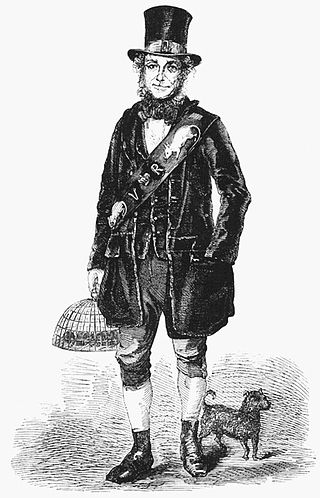
London Labour and the London Poor is a work of Victorian journalism by Henry Mayhew. In the 1840s, he observed, documented and described the state of working people in London for a series of articles in a newspaper, the Morning Chronicle, which were later compiled into book form.
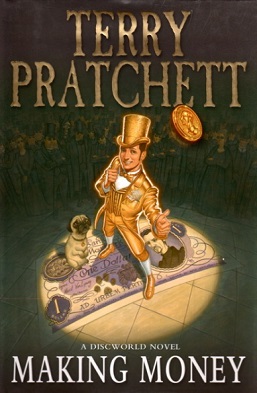
Making Money is a fantasy novel by British writer Terry Pratchett, part of his Discworld series, first published in the UK on 20 September 2007. It is the second novel featuring Moist von Lipwig, and involves the Ankh-Morpork mint and specifically the introduction of paper money to the city. The novel won the Locus Award for Best Fantasy Novel in 2008, and was nominated for the Nebula Award the same year.

Manual scavenging is a term used mainly in India for "manually cleaning, carrying, disposing of, or otherwise handling, human excreta in an insanitary latrine or in an open drain or sewer or in a septic tank or a pit". Manual scavengers usually use hand tools such as buckets, brooms and shovels. The workers have to move the excreta, using brooms and tin plates, into baskets, which they carry to disposal locations sometimes several kilometers away. The practice of employing human labour for cleaning of sewers and septic tanks is also prevalent in Bangladesh and Pakistan. These sanitation workers, called "manual scavengers", rarely have any personal protective equipment. The work is regarded as a dehumanizing practice.
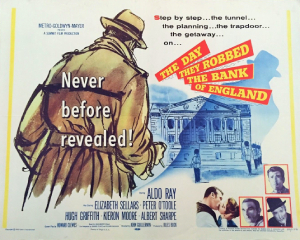
The Day They Robbed the Bank of England is a 1960 British crime film directed by John Guillermin and starring Aldo Ray, Elizabeth Sellars and Peter O'Toole. It was written by Howard Clewes and Richard Maibaum and based upon the 1959 novel of the same title by John Brophy.
Dodger or Dodgers may refer to:
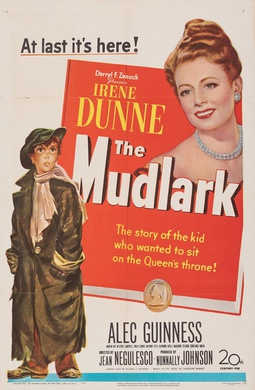
The Mudlark is a 1950 film made in Britain by 20th Century Fox. It is a fictional account of how Queen Victoria was eventually brought out of her mourning for her dead husband, Prince Albert. It was directed by Jean Negulesco, written and produced by Nunnally Johnson and based on the 1949 novel of the same name by American artillery sergeant and San Francisco newspaperman Theodore Bonnet (1908–1983). It stars Irene Dunne, Alec Guinness and Andrew Ray.

Ankh-Morpork is a fictional city-state that is the setting for many Discworld novels by Terry Pratchett.

Discworld is a comic fantasy book series written by the English author Terry Pratchett, set on the Discworld, a flat planet balanced on the backs of four elephants which in turn stand on the back of a giant turtle. The series began in 1983 with The Colour of Magic and continued until the final novel The Shepherd's Crown, which was published in 2015, following Pratchett's death. The books frequently parody or take inspiration from classic works, usually fantasy or science fiction, as well as mythology, folklore and fairy tales, and often use them for satirical parallels with cultural, political and scientific issues.

Snuff is the 39th novel in the Discworld series, written by Terry Pratchett. It was published on 11 October 2011 in the United States, and 13 October 2011 in the United Kingdom. The book sold over 55,000 copies in the first three days.
A toilet god is a deity associated with latrines and toilets. Belief in toilet gods – a type of household deity – has been known from both modern and ancient cultures, ranging from Japan to ancient Rome. Such deities have been associated with health, well-being and fertility and have been propitiated in a wide variety of ways, including making offerings, invoking and appeasing them through prayers, meditating and carrying out ritual actions such as clearing one's throat before entering or even biting the latrine to transfer spiritual forces back to the god.

Dodger is a novel written by Terry Pratchett, set in early Victorian London, and inspired by Charles Dickens's character the Artful Dodger. The book was released on 13 September 2012 in the UK.
References
- ↑ 1851, H. Mayhew, London Labour, vol. II, p 150/2: "The sewer-hunters were formerly, and indeed are still, called by the name of ‘Toshers’, the articles which they pick up in the course of their wanderings along shore being known among themselves by the general term ‘tosh’, a word more particularly applied by them to anything made of copper."
- ↑ Harper, Douglas. "Tosh". Online Etymology Dictionary . Retrieved 2012-12-03.
- ↑ Doubleday. ISBN 9780385619271